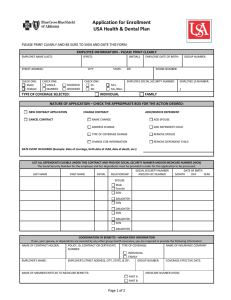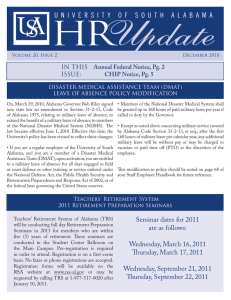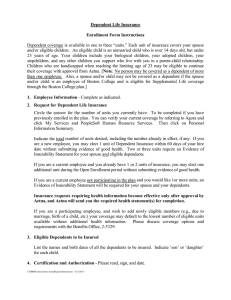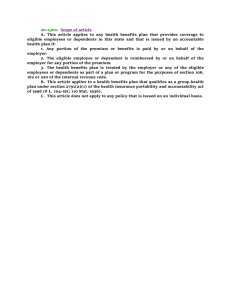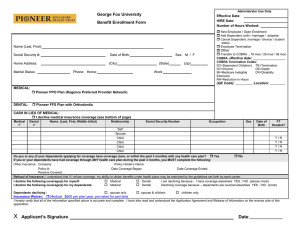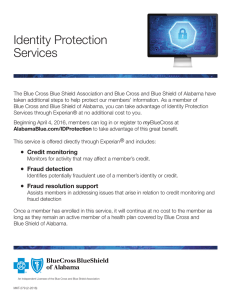Generic Proton Pump Inhibitor (PPI) Program Saves You Money
advertisement
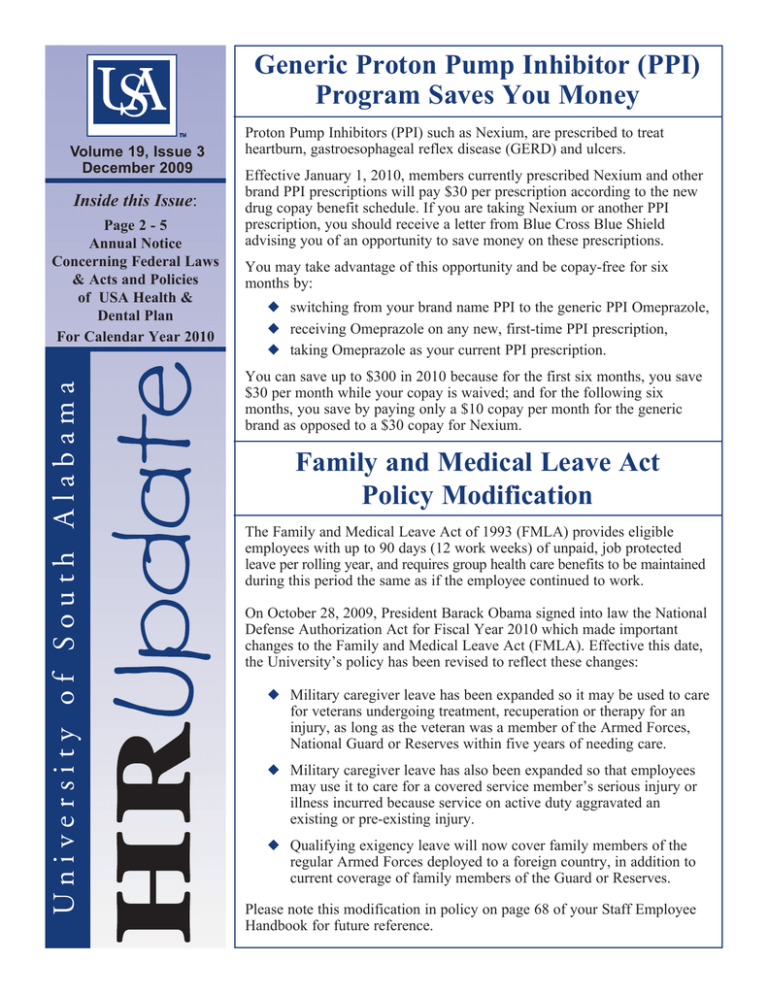
Generic Proton Pump Inhibitor (PPI) Program Saves You Money Volume 19, Issue 3 December 2009 Inside this Issue: University of South Alabama Page 2 - 5 Annual Notice Concerning Federal Laws & Acts and Policies of USA Health & Dental Plan For Calendar Year 2010 Proton Pump Inhibitors (PPI) such as Nexium, are prescribed to treat heartburn, gastroesophageal reflex disease (GERD) and ulcers. Effective January 1, 2010, members currently prescribed Nexium and other brand PPI prescriptions will pay $30 per prescription according to the new drug copay benefit schedule. If you are taking Nexium or another PPI prescription, you should receive a letter from Blue Cross Blue Shield advising you of an opportunity to save money on these prescriptions. You may take advantage of this opportunity and be copay-free for six months by: ◆ switching from your brand name PPI to the generic PPI Omeprazole, ◆ receiving Omeprazole on any new, first-time PPI prescription, ◆ taking Omeprazole as your current PPI prescription. You can save up to $300 in 2010 because for the first six months, you save $30 per month while your copay is waived; and for the following six months, you save by paying only a $10 copay per month for the generic brand as opposed to a $30 copay for Nexium. Family and Medical Leave Act Policy Modification The Family and Medical Leave Act of 1993 (FMLA) provides eligible employees with up to 90 days (12 work weeks) of unpaid, job protected leave per rolling year, and requires group health care benefits to be maintained during this period the same as if the employee continued to work. On October 28, 2009, President Barack Obama signed into law the National Defense Authorization Act for Fiscal Year 2010 which made important changes to the Family and Medical Leave Act (FMLA). Effective this date, the University’s policy has been revised to reflect these changes: ◆ Military caregiver leave has been expanded so it may be used to care for veterans undergoing treatment, recuperation or therapy for an injury, as long as the veteran was a member of the Armed Forces, National Guard or Reserves within five years of needing care. ◆ Military caregiver leave has also been expanded so that employees may use it to care for a covered service member’s serious injury or illness incurred because service on active duty aggravated an existing or pre-existing injury. ◆ Qualifying exigency leave will now cover family members of the regular Armed Forces deployed to a foreign country, in addition to current coverage of family members of the Guard or Reserves. Please note this modification in policy on page 68 of your Staff Employee Handbook for future reference. December 2009 Page 2 Annual Notice Concerning Federal Laws & Acts and Policies of Your Employer-Sponsored Health Plan For Calendar Year 2010 WHAT YOU SHOULD KNOW The University of South Alabama is pleased to provide its employees and their dependents with a quality health and dental plan providing some of the best benefits at the lowest cost to employees in our area. This newsletter provides important information about federal laws and acts that affect your coverage. It also includes information about the policies and procedures of your Plan. You should read this notice carefully and keep it with your important papers. This notice, along with your USA Health & Dental Plan Member Handbook, will assist you in understanding your rights under the Plan and your responsibilities to the Plan. Privacy Notice The USA Health & Dental Plan and its associates such as Blue Cross Blue Shield of Alabama adhere to and comply with the Privacy Act. The Plan and its associates have adopted practices and procedures to protect the privacy of your medical information. The Plan’s privacy policy in its entirety is available from the Human Resources department and is included in your Member Handbook. Blue Cross Blue Shield of Alabama also states their privacy policy on the Blue Cross Blue Shield website. Notice of the Plan’s Opt-Out of Some Federal Regulations The USA Health & Dental Plan has elected to opt-out of certain federal regulations including: the Health Insurance Portability & Accountability Act of 1996 (HIPAA), the Newborns’ and Mothers’ Health Protection Act of 1996 (NMHPA), the Mental Health Parity Act of 1996 (MHPA), the Mental Health Parity and Addiction Equity Act of 2008 and Michelle’s Law (2008). Health Insurance Portability and Accountability Act (HIPAA): Many of the provisions of HIPAA do not apply to the Plan, or the Plan is already in compliance with these provisions. For example, HIPAA requires a special enrollment period for employees who incur a changein-status event concerning eligibility of family members. This benefit has always been offered under the Plan. HIPAA prohibits group health plans from discriminating against employees on the basis of health status. The Plan has never imposed discriminatory rules. Current employees who have already served the 270-day pre-existing conditions exclusion waiting period, as explained in your Member Handbook, will not be affected by the University’s decision to opt-out of HIPAA. New employees and new dependents are required to serve the 270-day pre-existing conditions exclusion waiting period, as explained in your Member Handbook. Certificates of prior coverage from your previous insurance plan will not reduce the pre-existing conditions exclusion waiting period you are required to serve under this Plan. Pre-existing conditions include pregnancy or any disease, disorder or ailment, congenital or otherwise, which existed on or before the effective date of coverage, whether or not it was manifested or known in December 2009 Page 3 ANNUAL NOTICE CONCERNING FEDERAL LAWS & ACTS AND POLICIES OF YOUR PLAN any way, or any condition diagnosed or treated in the 12 months before the effective date of coverage. The determination of whether a medical condition is pre-existing is made by the claims administrator, Blue Cross Blue Shield of Alabama. The pre-existing conditions limitation applies to each member, individually, to initial eligibility and to Open Enrollment. The pre-existing conditions exclusion does not apply to newborn or adopted children. New employees and new dependents should give serious consideration to continuing the COBRA privilege granted under a previous employer’s health plan if there are any concerns that a medical condition may be considered pre-existing under the terms of this Plan. Departing employees or dependents no longer eligible will be provided a certification of coverage from Blue Cross Blue Shield of Alabama that can be submitted to possibly offset the waiting period for coverage of pre-existing conditions under a new health plan. Departing employees and dependents no longer eligible for coverage will be entitled to COBRA coverage. Newborns’ and Mothers’ Health Protection Act (NMHPA): The NMHPA establishes minimum inpatient hospital stays for newborns and mothers following delivery, based on medical necessity. The Plan has never imposed limitations regarding the length of an inpatient hospital stay following delivery. The Plan’s decision to opt-out of NMHPA will have no effect on current or new employees. Mental Health Parity and Addiction Equity Act of 2008 (MHPAEA): The MHPAEA expands MHPA by establishing parity of mental health and substance use benefits to include substance use disorder benefits as well as mental health benefits. It also prohibits applying financial requirements or treatment limitations that are more restrictive than the predominant financial requirement or treatment limitations that apply to substantially all medical and surgical benefits. The USA Health & Dental Plan does not provide parity and has limits on certain services and a maximum dollar limit for mental and substance use treatment. These limits are explained in the Member Handbook. You should read this handbook carefully to understand the benefits offered. You should consult with your medical provider and Blue Cross Blue Shield to coordinate your care within the benefits offered by the Plan. Michelle’s Law (2008): Michelle’s Law provides that a group health plan may not terminate the coverage of a full-time student as a result of that individual ceasing to meet the definition of a full-time student due to a medically necessary leave of absence. The USA Health & Dental Plan has opted-out of this law. The Plan does not allow coverage continuation for full-time students as a result of a medically necessary leave of absence, except as provided by the COBRA continuation of coverage. These limits are explained in the Member Handbook. Women’s Health & Cancer Rights Act: The Plan complies with the Women’s Health and Cancer Rights Act, providing the following benefit: The Plan provides medical benefits for mastectomies for treatment of breast cancer including reconstructive surgery of the breast on which the mastectomy was performed, and of the other breast to produce a symmetrical appearance. It also provides prostheses and coverage of physical complications December 2009 Page 4 ANNUAL NOTICE CONCERNING FEDERAL LAWS & ACTS AND POLICIES OF YOUR PLAN resulting from all stages of the mastectomy, including lymphedema. Coverage of prostheses includes initial placement of prostheses and replacements as determined to be medically necessary. Coverage of prostheses also includes the brassiere required to hold the prostheses, limited to a Plan year maximum benefit of four (4) brassieres. Notice of a Special Enrollment Period for a Change-In-Status Event If you or any of your family members declined coverage in the Plan when first eligible for coverage (or during the annual Open Enrollment period), you may enroll in the Plan or enroll your eligible dependents when certain events cause a change-in-status event. Some change-in-status events result in termination of coverage for a dependent. To make an enrollment change due to a change-in-status event, you must contact the Human Resources department within 30-days (unless otherwise noted) of the event. Change-in-status events include: 1. A change in your marital status (marriage, divorce, legal separation or death of your spouse). 2. A change in the number of your dependents (birth or adoption of a child, death of a child, or obtaining legal custody of a child who permanently resides in your home and is not a foster child, or obtaining legal guardianship of a child because the child’s parents are dead or have had their parental rights terminated by court action). 3. A change in your employment status (starting/ending employment, changing from part-time to fulltime or vice versa, taking or returning from an approved leave). 4. A change in your spouse’s employment status (starting/ending employment, changing from part-time to full-time or vice versa, a strike or lockout, or your spouse taking or returning from an unpaid leave or leave under the Family and Medical Leave Act or USERRA). 5. Exhaustion of your coverage period under a previous employer’s COBRA continuation. 6. A significant change in the costs of or coverage provided by your spouse’s employer-sponsored health plan. 7. A significant change in the costs of or coverage provided by this Plan. 8. A change in the eligibility status of a dependent child (marriage of the child, child reaching the maximum age for coverage under the Plan, child meeting or no longer meeting the definition of a fulltime student or child becoming employed on a regular, full-time basis). 9. An end to the disability of a disabled child enrolled as your dependent under the Plan. 10. A change in your residence or work site, or that of a spouse or dependent, which affects ability to access benefits under this or another employer-sponsored health plan. 11. A required change due to a court order. 12. You or your dependent becoming entitled to Medicare or Medicaid. 13. You or your dependent(s) loss of coverage under Medicaid or a State Children’s Health Insurance Plan (SCHIP) because of loss of eligibility. Enrollment request must be made within 60 days of the termination of coverage. 14. You or your dependent(s) becomes eligible for the premium assistance under Medicaid or SCHIP. Enrollment request must be made within 60 days of becoming eligible for the premium assistance. Employees and/or eligible dependents who enroll due to a change-in-status event may have the preexisting conditions exclusion waiting period waived in whole or in part, by receiving credit for the period of time the employee has been employed in a benefits-eligible position. To make an enrollment change due to a change-in-status event, you must make application and provide written documentation within 30 days of the event. December 2009 Page 5 ANNUAL NOTICE CONCERNING FEDERAL LAWS & ACTS AND POLICIES OF YOUR PLAN Employees and/or their eligible dependents who enroll during the Open Enrollment period will be subject to the 270-day pre-existing conditions exclusion waiting period. Section 125 Premium Conversion Plan The Section 125 Premium Conversion Plan allows you to pay your employee contribution for the Plan with pre-tax dollars through salary reduction rather than regular pay. The employee contribution is deducted from your paycheck before taxes are withheld. This allows you to increase your spendable income by reducing your taxes (your Social Security retirement benefit may be slightly reduced). All eligible employees are automatically enrolled in the Section 125 Premium Conversion Plan. You may change your election for pre-tax premiums for the coming year during the Open Enrollment period held in November, or during the Plan year if you incur a change-in-status event. Notice of Your Right To COBRA Continuation of Coverage Under the Plan The right to COBRA continuation coverage was created by a federal law, the Consolidated Omnibus Budget Reconciliation Act of 1985 (COBRA). COBRA continuation coverage can become available to you when you would otherwise lose your group health coverage. It can also become available to other members of your family who are covered under the Plan when they would otherwise lose their group health coverage. For additional information about your rights and obligations under the Plan and under federal law, you should review the Member Handbook or contact the Human Resources department or Blue Cross Blue Shield of Alabama for additional information. There are time limits on when a member may apply for the COBRA continuation of coverage. It is vital that you notify the Human Resources department when there is a COBRA qualifying event that may affect your coverage or that of your dependent, such as: 1) your hours of employment are reduced, 2) your employment ends for any reason, 3) your spouse dies, 4) your spouse’s hours of employment are reduced, 5) your spouse’s employment ends, 6) your spouse becomes entitled to Medicare benefits, 7) you become divorced or legally separated from your spouse, 8) the child’s parent-employee dies, 9) the parentemployee’s hours of employment are reduced, 10) the parent-employee’s employment ends, 11) the parent-employee becomes entitled to Medicare benefits, 12) the parents become divorced or legally separated, 13) the child stops being eligible for coverage under the Plan as an eligible dependent. The American Recovery and Reinvestment Act of 2009 (ARRA) provides a federal subsidy reducing the COBRA premium due to an involuntary loss of employment through December 31, 2009. The federal government will pay up to 65% of the cost of COBRA coverage for up to 9 months. Additional information on this special subsidy can be obtained from the Human Resources department or Blue Cross Blue Shield of Alabama. Contact Human Resources You may contact the Human Resources department by calling one of the numbers listed below: USA Campus (251)-460-6133 USA Medical Center (251)-471-7325 USA Children’s & Women’s (251)-415-1604 Notice Date: 12/01/2009 Human Resources University of South Alabama TRP Bldg III, Suite 2200 307 N University Blvd. Mobile, Alabama 36688-0002 Non-Profit U.S. Postage PAID Mobile, AL Permit No. 506 TM Page 6 December 2009 UNIVERSITY OF SOUTH ALABAMA FRINGE BENEFITS COMMITTEE Mr. M. Wayne Davis (Chair) Vice President Financial Affairs AD 170, 460-6243 Ms. Amy Fleet Secretary V Marketing MCOB 360, 460-6412 Dr. Robert Shearer Assistant to the President Academic Office of the President AD 122, 460-6111 Dr. Lanier Cauley Associate Professor Mechanical Engineering EGCB 208, 460-6168 Dr. David Johnson Sr. Vice President Academic Affairs AD 300, 460-6261 Ms. Barbara Shirvanian Administrative Assistant II Student Affairs SC 270, 460-6172 Dr. Thomas Chilton Associate Dean Education UCOM 3610, 380-2738 Mr. David Knight Storekeeper II Supply, Processing and Distribution UMC, 471-7424 Dr. David Turnipseed Professor Management MCOB 332, 414-8087 Ms. Elnora Davis Manager, Supply Distribution Central Supply CWH, 415-1615 Mr. Andy Lightbourne Assoc Dir, Computer Ctr/Acad Comp Computer Services Center CSC 207, 460-6161 Dr. Allan Tucker Chair Pathology UMC, 471-7799 Mr. Pat Downing Executive Director USA Brookley Center BCLY 0254, 431-6445 Mr. John P. Pannelli Asst. Vice President, Medical Financial Affairs COM Business Office CSAB 269, 460-7188 Ms. Karen Watts Nursing Project Coordinator Quality Management CWEB 2, 415-1289 Mr. Charles Dunnam Electrician II Maintenance MSHP, 460-7111 Ms. Kelly Peters Associate Controller Business Office AD 380, 460-6653 Ms. Carolyn Williams Nurse Manager Medical Surgical 5th UMC, 471-7656 Dr. Julie Estis Assistant Professor Speech Pathology and Audiology UCOM 2501, 380-2633 Dr. Victoria Rivizzigno Assistant Dean Dean’s Office, Arts and Sciences HUMB 110, 460-7811
